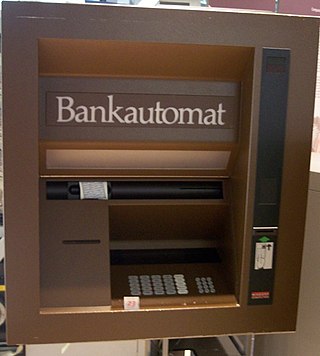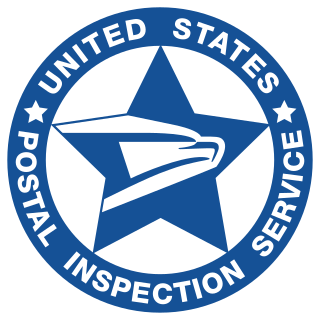
An automated teller machine (ATM) is an electronic telecommunications device that enables customers of financial institutions to perform financial transactions, such as cash withdrawals, deposits, funds transfers, balance inquiries or account information inquiries, at any time and without the need for direct interaction with bank staff.

Phishing is a form of social engineering and a scam where attackers deceive people into revealing sensitive information or installing malware such as viruses, worms, adware, or ransomware. Phishing attacks have become increasingly sophisticated and often transparently mirror the site being targeted, allowing the attacker to observe everything while the victim navigates the site, and transverses any additional security boundaries with the victim. As of 2020, it is the most common type of cybercrime, with the FBI's Internet Crime Complaint Center reporting more incidents of phishing than any other type of cybercrime.
Bank fraud is the use of potentially illegal means to obtain money, assets, or other property owned or held by a financial institution, or to obtain money from depositors by fraudulently posing as a bank or other financial institution. In many instances, bank fraud is a criminal offence.
Cheque fraud or check fraud refers to a category of criminal acts that involve making the unlawful use of cheques in order to illegally acquire or borrow funds that do not exist within the account balance or account-holder's legal ownership. Most methods involve taking advantage of the float to draw out these funds. Specific kinds of cheque fraud include cheque kiting, where funds are deposited before the end of the float period to cover the fraud, and paper hanging, where the float offers the opportunity to write fraudulent cheques but the account is never replenished.

The United States Postal Inspection Service (USPIS), or the Postal Inspectors, is the federal law enforcement arm of the United States Postal Service. It supports and protects the U.S. Postal Service, its employees, infrastructure, and customers by enforcing the laws that defend the United States' mail system from illegal or dangerous use. Its jurisdiction covers any crimes that may adversely affect or fraudulently use the U.S. Mail, the postal system, or postal employees. With roots going back to the late 18th century, the USPIS is the oldest continuously operating federal law enforcement agency.

The Fair and Accurate Credit Transactions Act of 2003 is a U.S. federal law, passed by the United States Congress on November 22, 2003, and signed by President George W. Bush on December 4, 2003, as an amendment to the Fair Credit Reporting Act. The act allows consumers to request and obtain a free credit report once every 12 months from each of the three nationwide consumer credit reporting companies. In cooperation with the Federal Trade Commission, the three major credit reporting agencies set up the web site AnnualCreditReport.com to provide free access to annual credit reports.

A Lebanese loop is a device used to commit fraud and identity theft by exploiting automated teller machines (ATMs). In its simplest form, it is a strip or sleeve of metal or plastic which blocks the ATM's card slot, causing any inserted card to be apparently retained by the machine, allowing it to be retrieved by the fraudster when the card holder leaves.
A credit freeze allows an individual to control how a consumer reporting agency is able to sell personal financial identity data. The credit freeze locks the data at the consumer reporting agency until the individual gives permission for the release of the data.
A money mule, sometimes called a "smurfer", is a person who transfers money acquired illegally, such as by theft or fraud. Money mules transfer funds in person, through a courier service, or electronically, on behalf of others. Typically, the mule is paid for services with a small part of the money transferred. Money mules are often recruited on-line under the guise of legitimate employment, not aware that the money they are transferring is the product of crime. Similar techniques are used to transfer merchandise illegally.
An identity score is a system for detecting identity theft. Identity scores are increasingly being adopted as a means to prevent fraud in business and as a tool to verify and correct public records.
LifeLock by Norton was an American software company active from 2005 to 2017. The company was best known for its eponymous LifeLock identity theft prevention software, now sold by Gen Digital after the latter acquired LifeLock in 2017. LifeLock's system monitors for identity theft, the use of personal information, and credit score changes.

Credit card fraud is an inclusive term for fraud committed using a payment card, such as a credit card or debit card. The purpose may be to obtain goods or services or to make payment to another account, which is controlled by a criminal. The Payment Card Industry Data Security Standard is the data security standard created to help financial institutions process card payments securely and reduce card fraud.
Richard Todd Davis, also known as Todd Davis, is the cofounder of LifeLock, an American identity theft protection company based in Tempe, Arizona, that became a subsidiary of Symantec in 2019.

Albert Gonzalez is an American computer hacker, computer criminal and police informer, who is accused of masterminding the combined credit card theft and subsequent reselling of more than 170 million card and ATM numbers from 2005 to 2007, the biggest such fraud in history. Gonzalez and his accomplices used SQL injection to deploy backdoors on several corporate systems in order to launch packet sniffing attacks which allowed him to steal computer data from internal corporate networks.
Trusteer is a Boston-based computer security division of IBM, responsible for a suite of security software. Founded by Mickey Boodaei and Rakesh K. Loonkar, in Israel in 2006, Trusteer was acquired in September 2013 by IBM for $1 billion.

Armenian Power 13, also known as AP, the Armenian Mob, or Armenian Mafia is an Armenian criminal organization and street gang founded and currently based in Los Angeles County, California. They are involved in drug trafficking, murder, assault, fraud, identity theft, illegal gambling, kidnapping, racketeering, robbery and extortion. They are believed to have around 200 members and hundreds of associates, according to the U.S. attorney’s office. They are also well known for their connections with the Mexican Mafia.
Identity theft involves obtaining somebody else's identifying information and using it for a criminal purpose. Most often that purpose is to commit financial fraud, such as by obtaining loans or credits in the name of the person whose identity has been stolen. Stolen identifying information might also be used for other reasons, such as to obtain identification cards or for purposes of employment by somebody not legally authorized to work in the United States.

Carding is a term of the trafficking and unauthorized use of credit cards. The stolen credit cards or credit card numbers are then used to buy prepaid gift cards to cover up the tracks. Activities also encompass exploitation of personal data, and money laundering techniques. Modern carding sites have been described as full-service commercial entities.
Terry Cutler is a Canadian cyber security expert and teacher, often described as an "ethical hacker" for his long term work with cyber security and protection. Cutler is the founder, former CTO, and current CEO of Cyology Labs and the vice-president of cyber security at SIRCO. He is also the creator of "The Course On Internet Safety". Cyology Labs's focal point is cyber security and data safety. Prior to founding Cyology Labs in 2015, Cutler founded Digital Locksmiths, Inc. focusing on data security of cloud and mobile solutions. Cutler is an often cited source on Cyber security and has been featured on various televisions shows across Canada. He describes himself as a "cyologist", a trademarked term of his own invention for a person who works in cyber security.
Cryptocurrency and crime describe notable examples of cybercrime related to theft of cryptocurrencies and some methods or security vulnerabilities commonly exploited. Cryptojacking is a form of cybercrime specific to cryptocurrencies that have been used on websites to hijack a victim's resources and use them for hashing and mining cryptocurrency.









